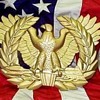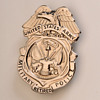Posted 10 years ago
 Chrisnp
Chrisnp
(310 items)
The US Model 1832 Foot Artilleryman’s Sword was modeled after the French 1816 Foot Artilleryman’s sword which was obviously based on some Victorian notion of a Roman gladius. Why someone thought artillerymen should be equipped with ancient Roman swords is beyond me. It is short, heavy and unwieldy as a weapon, but probably made for a handy tool around camp. The French called their version a “cabbage-cutter.” Reports from the Second Seminole War (1835-42) say our version was effective in cutting brush to make way through the Florida swamps. As a weapon, it was intended to be used as a last defense by artillerymen if their gun was over-run. I imagine I could do serious damage with this thing, but how do I get past the infantryman’s bayonet or cavalryman’s saber to do it? Naturally, the Army kept it through the Mexican War, Civil War and beyond.
The 19 inch blade is double edged with three fullers; two in the back, and a longer one out front. The blade is elliptical in cross section, and tapers slightly for the first four inches before widening again, then coming to a spear point. At the base of the blade are stamped with a barely imprinted eagle and the name “N.P. AMES / SPRINGFIELD.” Nathan P. Ames would retire in 1846, but the Ames Company would continue making swords into the 20th century. The other side is marked “US” over the year 1843, over “JCB”, for Joseph C. Bragg, the government arms inspector from 1841-1849, who accidentally stamped his initials upside-down. The hilt is brass with an American eagle and shield on the pommel and an imitation of eagle feathers (or fish scales) covering the grip. Unfortunately the hilt is cracked under the third rivet. The crossguard has another small inspector’s stamp in script; “W.A.T.” for William Anderson Thornton, an inspector from 1840 to 1861.






















Looks like it could have used a better grip. Does seem to be an interesting piece. Perhaps the key to using it was infighting. Doubt if it was ever used much, they probably had other weapons they used.
Yes, I doubt it was used as a weapon often either. It's cold here, and when I picked it up just now, I got a chill from the cold brass. I can only imagine grasping it when it's been outside in the dead of winter. I also tried a little shadow fencing, and it feels somewhat awkward in the thrust and parry. To me it only feels natural when used in a chopping motion.
One of my favorites-- purely based on the appearance. Agree it came up short on functionality, although many swords/ bayonets have that same issue.
I once owned a Civil War image of a soldier with one of these.
scott
It does have a certain theatrical flair Scott.
Thanks for the love petey, CindB, battlegear, lzenglish, Jewels, Militarist, Manikin, southcop, DrFluffy, fortapache, aghcollect and officialfuel.
Chris
My father in-law just gave me one he has had for years. He believes it was his great, great grandfather's. He spray painted the blade with Rustoleum about 50 years ago. I would like to find someone who can restore it, but don't trust a lot of folks. Any ideas and advice you all have would be appreciated.